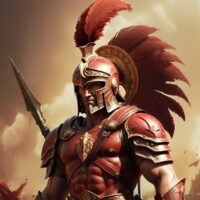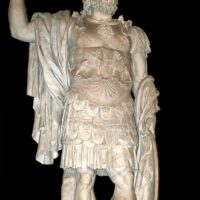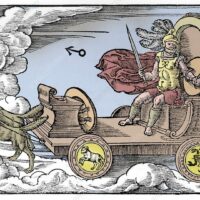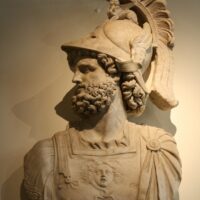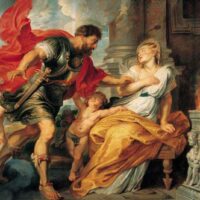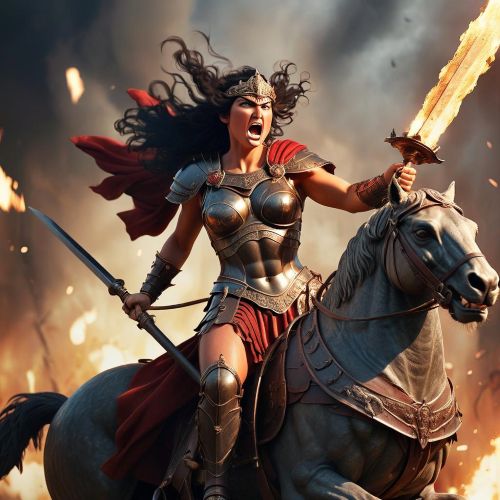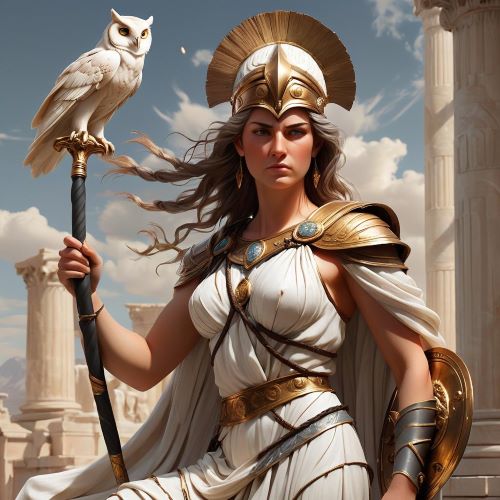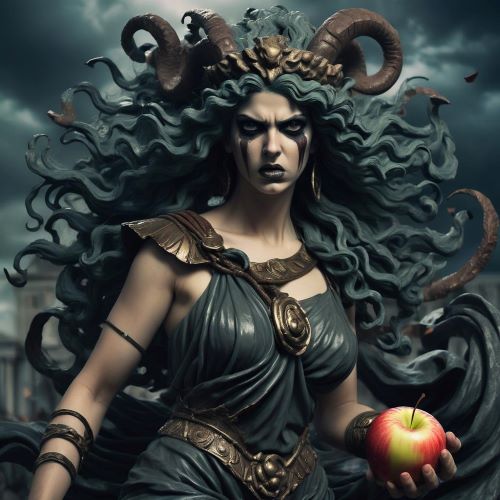Mars : God of War
Listen
Mars
Introduction
In Roman mythology, Mars was a deity of immense significance, occupying a crucial role in the pantheon. Esteemed not only as the god of war but also as a protector of agriculture, he represented the complex duality of early Roman society. Mars was integral to both the martial ethos and the agricultural practices of Rome, symbolizing the city’s vigor and growth. His multifaceted nature made him a key figure in Roman religious and state rituals, reflecting the broader values and spirituality of the ancient Romans. Mars’s influence extended beyond the battlefield, embodying both the aggressive spirit of war and the nurturing aspects of fertility.
Physical Traits
Mars is typically portrayed as a powerful and commanding deity, embodying his role as the god of war through a robust and muscular form. He is often shown wearing detailed armor, equipped with a spear or sword, and sometimes depicted with a red helmet or cloak, symbolizing the blood and intensity of battle. His stern and resolute demeanor reflects his martial attributes. However, Mars’s representation also includes a gentler aspect, particularly in his role as the guardian of agriculture. In these depictions, he may be seen with a plow, highlighting his nurturing side and connection to fertility.
Family
Mars’s familial ties are pivotal to his role in Roman mythology. As the son of Jupiter, the king of the gods, and Juno, the queen of the gods, Mars holds a prominent position among the deities. This lineage accentuates his high status and authority. His divine parentage aligns him with Jupiter’s dominion over the sky and thunder, reinforcing Mars’s martial power.
An intriguing aspect of Mars’s myth is his relationship with Venus, the goddess of love and beauty. Their union, despite their contrasting natures, resulted in several divine offspring, including Cupid, the god of love. Additionally, Mars is linked to the myth of Rhea Silvia, a vestal virgin who, according to legend, bore the twins Romulus and Remus after being impregnated by him. These twins are central to Roman mythology as the founders of Rome, further cementing Mars’s significance not only as a warrior but also as a progenitor of Rome’s legendary heroes and its origins.
Other names
Mars is known by a range of names and titles that reflect his diverse roles and attributes. In Greek mythology, his counterpart is Ares, though Mars’s associations extend beyond the martial to include agriculture and fertility. The title “Mars Gradivus” emphasizes his role as a guardian of soldiers and a symbol of military strength. Another prominent title, “Mars Ultor,” denotes his function as an avenger, particularly in relation to Rome’s enemies.
Additionally, Mars is associated with “Quirinus,” a deified Romulus, underlining his connection to Rome’s foundation. The epithet “Pater” highlights his paternal role toward the Roman people. In more archaic and poetic references, he is called Mavors or Mavorte, while the Etruscans identified him with Maris or Laran, reflecting his varied nature and significance across different cultures.
Powers and Abilities
Mars’s powers and abilities are vast, reflecting his dual nature as both a war deity and a fertility god. As the god of war, Mars is endowed with immense strength, strategic insight, and unwavering resolve. He plays a critical role in ensuring victory and safeguarding Rome from threats, with his martial prowess highlighted during various festivals, such as the “Festival of Mars” in March, which marks the start of the military campaign season.
In addition to his martial attributes, Mars is deeply associated with fertility and agriculture. He is believed to oversee the growth and productivity of crops, making him essential to the Roman economy. This dual role underscores the Roman belief in the necessity of balancing military strength with agricultural prosperity. Unlike his Greek counterpart Ares, who is often depicted in a more negative light, Mars represents a force that not only engages in combat but also protects and nurtures the Roman people, reinforcing his role as their guardian and father.
Modern Day Influence
Mars’s influence extends into modern culture and symbolism, continuing to impact various aspects of contemporary life. The planet Mars, named after the Roman god, symbolizes both conflict and exploration, reflecting his enduring legacy. In modern media, Mars appears frequently, embodying themes of strength, valor, and leadership in novels, films, and television series, where he is portrayed as both a historical figure and a mythological archetype.
His legacy is evident in contemporary symbolism as well. Mars represents qualities such as aggression, courage, and victory, appearing in contexts ranging from sports team mascots to military insignia. Additionally, military terminology in many languages, including English, incorporates references to Mars, such as “martial law” and “martial arts.”
While worship of Mars as a deity has diminished, his influence persists in language, culture, and popular imagination. The planet Mars and the month of March are named after him, and his image continues to inspire various forms of art and literature. The construction of the Mars Ultor temple by Augustus highlights the shift from a focus on warfare to a more peaceful Rome, reflecting the complex legacy of Mars in both ancient and modern contexts.
Related Images
Frequently Asked Questions
What is lorem Ipsum?
I am text block. Click edit button to change this text. Lorem ipsum dolor sit amet, consectetur adipiscing elit. Ut elit tellus, luctus nec ullamcorper mattis, pulvinar dapibus leo.
What is lorem Ipsum?
I am text block. Click edit button to change this text. Lorem ipsum dolor sit amet, consectetur adipiscing elit. Ut elit tellus, luctus nec ullamcorper mattis, pulvinar dapibus leo.
What is lorem Ipsum?
I am text block. Click edit button to change this text. Lorem ipsum dolor sit amet, consectetur adipiscing elit. Ut elit tellus, luctus nec ullamcorper mattis, pulvinar dapibus leo.
What is lorem Ipsum?
I am text block. Click edit button to change this text. Lorem ipsum dolor sit amet, consectetur adipiscing elit. Ut elit tellus, luctus nec ullamcorper mattis, pulvinar dapibus leo.
What is lorem Ipsum?
I am text block. Click edit button to change this text. Lorem ipsum dolor sit amet, consectetur adipiscing elit. Ut elit tellus, luctus nec ullamcorper mattis, pulvinar dapibus leo.


